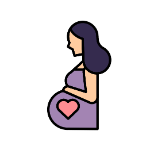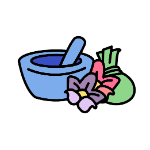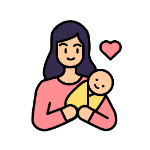
Confinement Wellness
Understanding Traditional Chinese Confinement Or "Zuo Yue Zi" Practices, Should We Follow Them?
4 min read | Updated on 30-03-2023 by HappyPreggie
(Image credits to babybonus.com)
A confinement period is a recovery time that is dedicated to new mothers who had just gone through the labour process. This period is known as Zuo Yue Zi in the Chinese culture and is regarded as a very important traditional confinement practice that is developed to help mothers through rehabilitation. The practice normally takes up the duration of one month to 45 days for a better effect. For some mothers, Zuo Yue Zi could be seen as a tough period where they are instructed to abide by many rules and restrictions that limit their movements and freedom. However, these practices are extremely beneficial for their healing journey as it consists of various great elements.
#1 Midwifery Practice
(Image credits to Chinadaily.com)
Like the Malay confinement practices, many Chinese confinement practices also choose to use the help of a midwife. The midwife is a trained confinement lady hired to take care of mothers during the process of confinement. The confinement lady not only takes care of the new mother but will also take care of the newborn. She assists the new mother’s bathing needs as well as her diet for a 30 days confinement period.
#2 No Cooking
(Image credits to eater.com)
After giving birth, Chinese mothers usually do not cook. Therefore, many women have either their mother, mom-in-law or confinement lady to help them out during the confinement period. In particular, the confinement lady will cook, take care of the baby, take care of the mom, and help you step into motherhood with your baby.
#3 No showering
(Image credits to CNN.com)
Similar to the Malay culture, Chinese mothers are also not allowed to bathe for several days or even a week, depending on the mother’s comfort. They give more importance to the no hair-washing practice. If mothers feel uncomfortable with this, they can still clean their hair with a gauze-type of material dipped in alcohol and wrapped around the comb. They can also use a ‘dry shampoo’ which is available in most pharmacies. As for not showering, mothers can take warm sponge baths with ginger or neem leaves to ward off body odour.
#4 No Air Conditioning
(Image credits to TimesofIndia.com)
The basic principle Chinese women adhere to most of the time during confinement is keeping the body away from cold things or the environment like wind and water. This practice is to ensure the mother's body retains as much heat as possible. It is believed that this will help keep their health problems such as rheumatism, arthritis, headaches and body pains at bay later in life.
#5 Herbal bath
(Image credits to learningherbs.com)
The bathwater is usually mixed with the leaves or roots of bitter melon or bitter gourd that are easily available and sold in the shops of traditional Chinese medicine. In Sabah, Chinese women specifically use water mixed with the herb ‘sambung-sambung’ (Blumea balsamifera) in their confinement bath. This herb prevents the body of the woman in confinement from wind, and thus prevents a mother from body aches.
#6 Food and Nutrition
(Image credits to asksiryoong.com)
During this period, mothers in their confinement are encouraged to eat carefully prepared meals with ‘warming’ ingredients such as ginger, black pepper, sesame oil and rice wine. They are believed to help with the healing process and help new mothers restore their health and vitality faster. A traditional Chinese confinement food practice includes fish soups, which can boost low milk supply and improve the breast milk quantity as well. ‘Cooling’ foods such as cold drinks, cucumber, cabbage and pineapples are not allowed. Foods that cause ‘wind’ such as onions and jackfruit are also avoided during this period as they are believed to cause colic in your baby.
#7 Emphasis on Baby
(Image credits to morinagaplatinum.com)
How are babies emphasised in the Chinese confinement practices? Normally, Chinese-Sabahans apply eucalyptus oil to the whole body of the baby before and after bathing but now, this is also being done in the west part of Malaysia. According to the practice of the Chinese community, the baby will be bathed in a mixture of herbs such as the roots and leaves of bitter melon because experts say that it has the ability to prevent the baby from jaundice and trapped wind.
#8 Exercises
(Image credits to Freepik)
Most of the time, mothers seem like they cannot do any exercises during confinement. However, according to traditional Chinese practices, there are some exercises that mothers are encouraged to do during the confinement period. Some of these include pelvic and lower body tilts, leg slides, head, neck and shoulder raise.
#9 Massages
(Image credtis to Freepik)
Massage is the most effective and cheapest way to get a mother’s body back in shape. It helps mothers to lose pregnancy weight without any risk. In addition, it is also significant for the mother’s internal wellbeing. Special ointments are used for massage, after which your abdomen is tightly bound. This is quite similar to the bengkung practices followed in the Malay culture. These practices are also followed strictly by the Indian community.
#10 Hot Stones
(Image credits to verywellhealth.com)
The practice of placing hot stones on a new mother’s tummy is to lift up the uterus. This treatment is believed to help remove impurities and cleanse the womb. Experienced traditional masseuses are hired to perform this practice as they are knowledgeable in certain techniques and stones’ placements.
Zuo Yue Zi has become a deeply rooted cultural norm in Chinese society. For a period ranging from a few weeks until the baby’s first-month celebration, new mothers observe several routines that are somewhat different from their typical day-to-day living. This is because the tradition is believed to bring great benefits for both the baby and the mother's health after complying with the confinement restrictions.
Want to read more? Check out this information about the Malay and Indian's traditional confinement practices.
Join the largest support network for family health and well-being. Ready to get started?
Get started
















